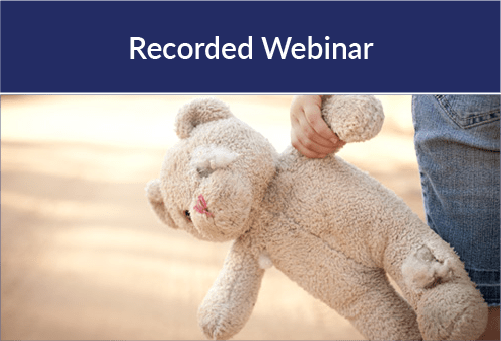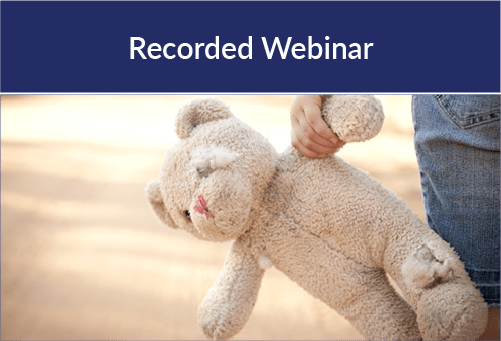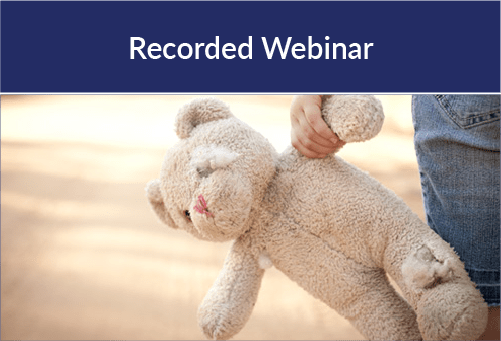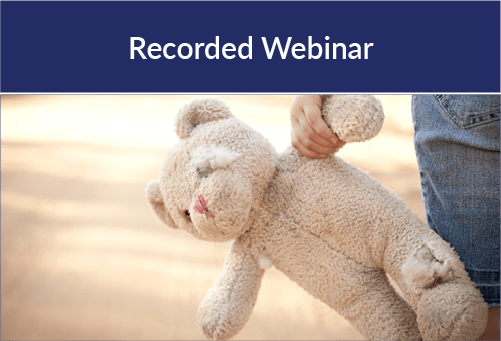


Examine the common medical and social myths and misconceptions that undermine the investigation and adjudication of child sexual abuse cases. Materials discussed will include the medical/legal definitions or "child", the evolving definition of "rape", and the different between statutory requirements for "consent" and "force".

Review a case study involving a 3-year old child who was physically and emotionally abused by his mother's boyfriend. It was not until he was unable to walk that his mother was forced to take him to the Emergency Department for medical attention. With the work of many dedicated people of multi-disciplines this case was brought to justice!

Delays in disclosure can present far-reaching challenges that impact the investigations and successful prosecution of child predators. Learn the ways in which the forensic interview can be used to maximize information and disclosure context from youth who have delayed waiting to tell.

Discuss the various dynamics of asphyxiation abuse in children and identify commonly missed opportunities for evidence-gathering. Attendees will be taught the basics of anatomy, discuss the various forms of asphyxiation and highlight the signs and symptoms that may be present after this type of attack. All members of the multidisciplinary team including law enforcement, CPS, forensic interviewers, medical providers and prosecutors will learn the tools to assess and interview children who have been asphyxiated. With proper training and protocol, practitioners have started to better identify this often missed and sometimes lethal crime, finally giving this crime and the victims a voice.

Discuss the various dynamics of asphyxiation abuse in children and identify commonly missed opportunities for evidence-gathering. Attendees will be taught the basics of anatomy, discuss the various forms of asphyxiation and highlight the signs and symptoms that may be present after this type of attack. All members of the multidisciplinary team including law enforcement, CPS, forensic interviewers, medical providers and prosecutors will learn the tools to assess and interview children who have been asphyxiated. With proper training and protocol, practitioners have started to better identify this often missed and sometimes lethal crime, finally giving this crime and the victims a voice.

Learn the signs of neglect, physical and sexual child abuse in an effort to gain a better understanding of how to identify victims. KNOW & TELL is a public responsibility movement, to educate all adults to KNOW the signs of abuse and TELL responsible authorities when they recognize them. Awareness of these signs is a critical step to protecting our children and helping to educate others. We all have a responsibility to protect children.

(THIS COURSE IS FOR CERTIFIED HEALTHCARE PROVIDERS ONLY) Learn the signs of neglect, physical, and sexual child abuse to identify a child victim and understand your responsibility as a healthcare professional and mandated reporter. Awareness of these signs is a critical step to protecting our children. We all have a responsibility to protect children. KNOW & TELL® is a public responsibility movement to educate all New Hampshire adults to KNOW the signs of abuse and TELL responsible authorities when they recognize them. Individuals living outside of the State of New Hampshire are welcome to participate in this training but should inquire with their own state as to reporting procedures and requirements.

Describe and encourage forensic interviewers to consider new strategies in interviewing children. Review strategies displaying children of all ages with a person-centered, person-first approach including information on interviewing children with disabilities.

Build and develop a broader understanding of children with disabilities as well as new strategies for effective interviewing and communicating. Display and Discover how crucial the multi-disciplinary team approach is, specifically those interviewing children. When allegations/concerns of abuse are reported and a child is interviewed, it is important for service providers to recognize the child’s background, perspective as well as their spectrum of intellectual and developmental disabilities.

Learn more about Child Protector, a free application designed to improve the investigative, administrative, and judicial handling of child physical abuse cases, as well as child fatalities, in a manner that reduces trauma to the child and family. Utilizing sophisticated and detailed medical illustration, professional narration and animation as well as x-rays and real images, Child Protector demonstrates the location, characteristics, and biomechanics of injuries in young children commonly encountered by Children's Division (CD) workers, legal professionals, law enforcement, and medical providers. The app provides a realistic view of injury mechanisms that enhance the investigators ability to gather pertinent scene and witness information, thus improving the accuracy and efficiency of the investigation. Animations, narration, and real images detail how bruises, burns, head injuries, fractures, and abdominal injuries occur through both accidents and abuse.
